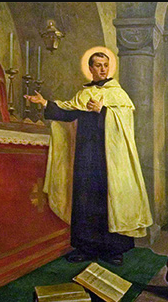 |
December 5 |
Optional Memorial
Bartholomew Fanti was born in Mantua: the year is unknown, but in 1452 he was already a Carmelite priest of the Congregation of Mantua. For thirty-five years at the Order's church in Mantua he was spiritual father and rector of the Confraternity of the Blessed Virgin Mary, for which he composed a rule and statutes. He is especially remembered for his love of the Eucharist. He died in 1495.
From the Common of Men Saints (Religious) except the following:
Office of Readings
The Second Reading
From the encyclical letter of Pope Paul VI, The Mystery of Faith
Christ is truly 'God with us'
In a most sublime manner, Christ is present in his Church as she offers in his name the sacrifice of the Mass. He is present in her as she administers the sacraments. But there is yet another manner in which Christ is present in his Church, a manner which surpasses all the others; it is his presence in the Sacrament of the Eucharist, which is for this reason 'a more consoling source of devotion, a more lovely object of contemplation, a more effective means of sanctification than all the other sacraments.' The reason is clear: it contains Christ himself and it is 'a kind of perfection of the spiritual life; in a way, it is the goal of all the sacraments.'
This presence is called 'real'—by which it is not intended to exclude all other types of presence as if they could not be 'real' too—but because it is presence in the fullest sense: that is to say, it is a substantial presence by which Christ, the God-Man, is wholly and entirely present.
Moreover the Catholic Church has held on to this faith in the presence in the Eucharist of the Body and Blood of Christ, not only in her teaching but also in her practice, since she has at all times given to this great Sacrament the worship which is known as Latria and which may be given to God alone.
The Catholic Church has always offered and still offers the cult of Latria to the Sacrament of the Eucharist, not only during Mass, but also outside of it, reserving Consecrated Hosts with the utmost care, exposing them to solemn veneration, and carrying them processionally to the joy of great crowds of the faithful.
In the ancient documents of the Church we have many testimonies of this veneration. The pastors of the Church, in fact, solicitously exhorted the faithful to take the greatest care in keeping the Eucharist which they took to their homes.
It is to be desired that the faithful, every day and in great numbers, actively participate in the sacrifice of the Mass, receive Holy Communion with a pure heart, and give thanks to Christ our Lord for so great a gift.
In the course of the day the faithful should not omit to visit the Blessed Sacrament, which according to the liturgical laws must be kept in the churches with great reverence in a most honorable location. Such visits are a proof of gratitude, an expression of love, and acknowledgment of the Lord's presence.
No one can fail to understand that the Divine Eucharist bestows upon the Christian people an incomparable dignity. Not only while the sacrifice is offered and the sacrament is received, but as long as the Eucharist is kept in our churches and oratories Christ is truly the Emmanuel, that is, 'God with us.' Day and night he is in our midst, he dwells with us full of grace and truth. He restores morality, nourishes virtues, consoles the afflicted, strengthens the weak. He proposes his own example to those who come to him that all may learn to be, like himself, meek and humble of heart and to seek not their own interests but those of God.
Anyone who approaches this august Sacrament with special devotion and endeavors to return generous love for Christ's own infinite love, will experience and fully understand—not without spiritual joy and fruit—how precious is the life hidden with Christ in God and how great is the value of converse with Christ, for there is nothing more consoling on earth, nothing more efficacious for advancing along the road of holiness.
Further, you realize, venerable brothers, that the Eucharist is reserved in the churches and oratories as in the spiritual center of a religious community or of a parish, yes, of the universal Church and of all of humanity, since beneath the appearance of the species, Christ is contained, the invisible Head of the Church,the Redeemer of the World, the Center of all hearts, 'by whom all things are and by whom we exist.'
From this it follows that the worship paid to the Divine Eucharist strongly impels the soul to cultivate a 'social' love, by which the common good is given preference over the good of the individual. Let us consider as our own the interests of the community, of the parish, of the entire Church, extending our charity to the whole world, because we know that everywhere there are members of Christ.
Responsory
R. He who eats my flesh and drinks my blood, * he will live in me and I will live in him.
V. For my flesh is real food and my blood is real drink. * He will live in me and I will live in him.
Prayer
Lord God,
you made Blessed Bartholomew Fanti
outstanding in his zeal for devotion to the Eucharist
and to the Blessed Virgin Mary.
May we experience in this regard
the same fullness of spirit that was his.
We ask this through our Lord.

